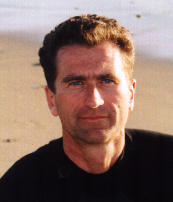Pirolli, Peter: Difference between revisions
article extended, link added |
No edit summary |
||
| Line 10: | Line 10: | ||
*Human-Information | *Human-Information | ||
*Cognitive Science | *Cognitive Science | ||
* | *[[http://www.infovis-wiki.net/index.php/Information_Foraging Information Foraging Theory]], Information Scent and Sense Making (e.g. Table Lense Method) | ||
Information Foraging includes strategies and technology for seeking, gathering, and using information e.g. on-line information in the web with its most important concept: Information Scent. | Information Foraging includes strategies and technology for seeking, gathering, and using information e.g. on-line information in the web with its most important concept: Information Scent. | ||
Revision as of 22:05, 10 April 2006

Peter Pirolli is a Fellow of the National Academy of Education.
His Grades are a B.Sc. in Psychology and Anthropology (Trent University, Canada) and a M.S. and Ph.D. in Cognitive Psychology (Carnegie Mellon University).
From 1985 to 1994 he was a professor at the School of Education at the University of California (Berkeley) and a member of the Cognitive Science Institute. There he did research on computational cognitive models of learning to program, intelligent tutoring systems, models of generic design problem solving, and learning-to-learn strategies.
Since 1991 he is a Principal Scientist at the Palo Alto Research Center (PARC) at the User Interface Research where his main research interests are
- Human-Information
- Cognitive Science
- [Information Foraging Theory], Information Scent and Sense Making (e.g. Table Lense Method)
Information Foraging includes strategies and technology for seeking, gathering, and using information e.g. on-line information in the web with its most important concept: Information Scent.
Besides this his other interests are sports like e.g. surfing, inline-skating, weightlifting, mountainbiking and running.